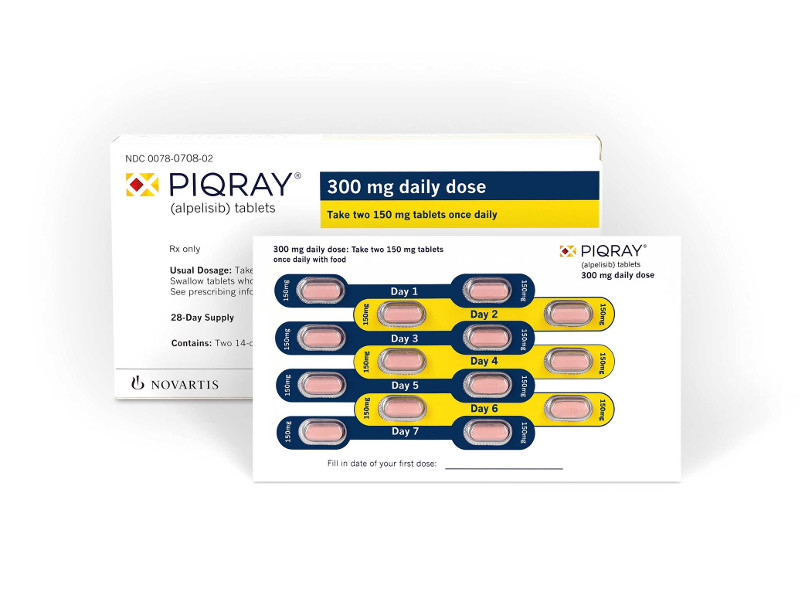Keytruda (pembrolizumab) vs Piqray (alpelisib)
Keytruda (pembrolizumab) vs Piqray (alpelisib)
Keytruda (pembrolizumab) is an immunotherapy drug that works by blocking the PD-1 pathway, thereby enhancing the body's immune response against cancer cells, and is commonly used in various types of cancers including melanoma, lung cancer, and head and neck cancers. Piqray (alpelisib), on the other hand, is a targeted therapy that specifically inhibits the PIK3CA gene in cancer cells, used for the treatment of hormone receptor-positive, HER2-negative, PIK3CA-mutated, advanced or metastatic breast cancer, often in combination with fulvestrant. The choice between Keytruda and Piqray would depend on the specific type of cancer, its molecular characteristics, and the patient's overall health profile, with Keytruda being more broadly applicable across different cancer types, while Piqray is indicated for a more specific patient population with certain genetic mutations.
Difference between Keytruda and Piqray
| Metric | Keytruda (pembrolizumab) | Piqray (alpelisib) |
|---|---|---|
| Generic name | Pembrolizumab | Alpelisib |
| Indications | Various types of cancers including melanoma, lung cancer, head and neck cancer, Hodgkin lymphoma, and others | Advanced or metastatic breast cancer in combination with fulvestrant in postmenopausal women, and men, with HR+, HER2- PIK3CA-mutated tumors |
| Mechanism of action | Programmed death receptor-1 (PD-1) blocking antibody | Phosphatidylinositol-3-kinase (PI3K) inhibitor, specifically for PI3KCA mutations |
| Brand names | Keytruda | Piqray |
| Administrative route | Injection (IV) | Oral (tablet) |
| Side effects | Fatigue, musculoskeletal pain, decreased appetite, itching, diarrhea, nausea, rash, fever, cough, dyspnea, constipation, pain, and abdominal pain | Hyperglycemia, rash, diarrhea, decreased appetite, nausea, fatigue, alopecia, and cough |
| Contraindications | Individuals with hypersensitivity to pembrolizumab or any of its excipients | Individuals with hypersensitivity to alpelisib or any of its excipients, those with severe hypersensitivity to peanuts or soy (due to excipients) |
| Drug class | Anti-PD-1 monoclonal antibody | PI3K inhibitor |
| Manufacturer | Merck & Co. | Novartis Pharmaceuticals |
Efficacy
Keytruda (Pembrolizumab) in Breast Cancer Treatment
Keytruda, known generically as pembrolizumab, is an immunotherapy drug that has shown efficacy in treating certain types of breast cancer. Specifically, it is approved for use in patients with metastatic triple-negative breast cancer (TNBC) that expresses PD-L1, as determined by an FDA-approved test. Pembrolizumab works by blocking the PD-1 pathway, which some cancer cells use to protect themselves from an immune system attack. By inhibiting this pathway, Keytruda can help the immune system to detect and fight cancer cells.
In clinical trials, Keytruda has demonstrated an improvement in progression-free survival (PFS) when used in combination with chemotherapy for patients with PD-L1-positive, previously untreated, inoperable or metastatic TNBC. However, it is important to note that Keytruda is not effective for all patients with breast cancer and is only indicated for a subset of patients with specific biomarkers.
Piqray (Alpelisib) in Breast Cancer Treatment
Piqray, also known as alpelisib, is a targeted therapy approved for use in combination with fulvestrant for the treatment of postmenopausal women, and men, with hormone receptor-positive, human epidermal growth factor receptor 2-negative (HR+/HER2-), PIK3CA-mutated, advanced or metastatic breast cancer following progression on or after an endocrine-based regimen. The presence of a PIK3CA mutation, which is one of the most common genetic alterations in HR+/HER2- breast cancer, can be detected through an FDA-approved test.
Clinical studies have shown that Piqray, when used in combination with fulvestrant, significantly extends PFS in patients with a PIK3CA mutation compared to fulvestrant alone. The efficacy of Piqray marks a significant advancement in the personalized treatment of breast cancer, offering a new option for patients with this specific genetic profile. As with any medication, the efficacy of Piqray can vary among individuals, and treatment should be tailored to the patient's specific condition and mutation status.
Regulatory Agency Approvals
Keytruda
-
European Medical Agency (EMA), European Union

-
Food and Drug Administration (FDA), USA

-
Health Canada

-
Therapeutic Goods Administration (TGA), Australia

-
Medsafe (NZ)

Piqray
-
European Medical Agency (EMA), European Union

-
Food and Drug Administration (FDA), USA

Access Keytruda or Piqray today
If Keytruda or Piqray are not approved or available in your country (e.g. due to supply issues), you can access them via Everyone.org.
How it works

Make an enquiry
Choose the medicine you want to buy, answer a couple of questions, and upload your prescription to speed things up. We’ll get back to you within 24 hours.


Make an enquiry
Choose the medicine you want to buy, answer a couple of questions, and upload your prescription to speed things up. We’ll get back to you within 24 hours.


Breeze through the paperwork
We'll guide you through the required documents for importing unapproved medicine, ensuring you have all the necessary information.


Get a personalized quote
We’ll prepare a quote for you, including medicine costs and any shipping, administrative, or import fees that may apply.


Receive your medicine
Accept the quote and we’ll handle the rest - sourcing and safely delivering your medicine.

Some text on this page has been automatically generated. Speak to your physician before you start a new treatment or medication.
Let's talk
If you have any questions, call us or send us a message through WhatsApp or email:
Contact us




